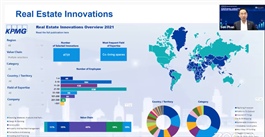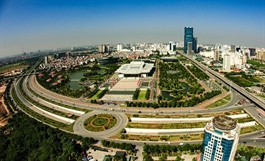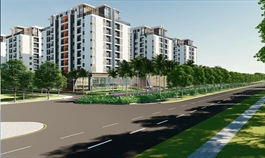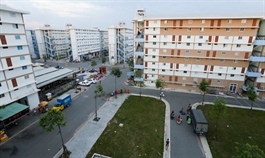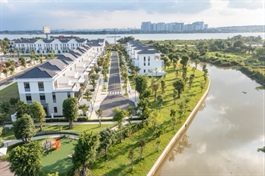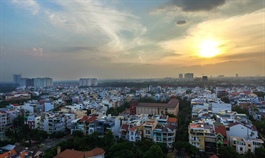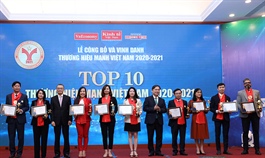Credit packages proposed for social housing development after pandemic
Credit packages proposed for social housing development after pandemic
One of the most important hurdles to restoring the economy after the COVID-19 pandemic is further investment in social housing development, especially for workers in industrial zones, according to the Ministry of Construction (MoC).

To this end, The Ministry of Construction (MoC) has proposed the Prime Minister put forward two credit packages, with a total value of VND65 trillion (US$2.82 billion), for social housing development, as part of a programme of socio-economic recovery after the COVID-19.
Ha Quang Hung, Deputy Head of the Ministry of Construction Department of Housing Management and Real Estate Market, said: “A credit package of VND15 trillion is under the medium-term public investment plan 2021-2025 to develop social housing products.
“The second credit package of VND50 trillion will be refinanced by the State Bank, with appropriate interest rates and terms for commercial banks, to give preferential loans to developers of housing projects for industrial parks (IPs) that workers lease; investors of social housing projects for sale, lease, or hire-purchase; and workers at industrial zones borrowing to buy or lease housing.”
According to the ministry, social housing is in dire need of support, particularly in areas that house workers near industrial parks, especially in the southern localities such as HCM City, Binh Duong, Dong Nai and Long An.
Le Hoang Chau, Chairman of the Real Estate Association of HCM City, said at present, only eight per cent of IPs and export processing zones (EPZs) in HCM City have accommodation for workers, while workers of the remaining IPs and EPZs must rent housing outside, causing difficulties in pandemic prevention.
“The Government has issued the Resolution 128 providing temporary guidance on "Safe adaptation, flexibility and effective control of the COVID-19 pandemic" to support for recovery of the economy, including the real estate market. However, real estate businesses, including social housing investors, expect the State to have specific solutions. We do not request financial support, we just need solutions on solving difficulties caused by overlapping regulations,” Chau said.
Viet Nam has had a policy on developing social housing products for workers for ten years, but when the pandemic began it found that workers have not benefited yet, according to expert Vu Dinh Anh.
"Therefore, Viet Nam needs to continue the policies on developing housing areas for workers in the next few years. If the housing security for workers is ensured, we will not see tens of thousands of workers without work and money moving thousands of kilometres back home, as happened recently," Anh said.
Solutions
The credit packages aim at promoting investment in social housing aimed at workers in urban areas, especially employees and workers working in industrial parks, Deputy Minister of Construction Nguyen Van Sinh said.
According to Sinh, the additional credit package aims to ensure the 'dual goals' of social security and housing for the disadvantaged while promoting economic recovery and removing difficulties for businesses in housing development and the real estate market.
With preferential policies, the State encourages all economic sectors to invest in building social housing products to help workers and employees in IPs improve their quality of life and accommodation conditions.
The MoC has also suggested that the People's Committees of provinces and centrally-run cities coordinate with the ministry in reviewing progress and conditions, and compiling a list of eligible projects for loans.
Priority will be given to investors of social housing projects that have been approved but delayed due to lack of capital.
The MoC has proposed that localities begin planning for investment projects, especially housing products for workers and employees in IPs.
The localities need to review and add housing projects for workers of IPs into the local five-year and annual housing development programmes and plans. They should also have specific mechanisms and solutions to create favourable conditions and administrative procedures to attract investors.
In addition, investment in essential infrastructure, such as schools, kindergartens, medical treatment facilities, cultural, training and sports facilities, both inside and outside social housing projects, needs to be paid attention to. According to the Ministry, some localities have not paid much attention to formulating plans to develop social housing projects in those areas.
The ministry also urged the Government to propose the National Assembly add social housing projects, including those to develop homes for workers in industrial parks, to the mid-term public investment plan in the 2021-2025 period.
Viet Nam needs an estimated VND220 trillion (US$9.6 billion) to build about 294,600 units of social housing for low-income earners in urban areas and industrial parks in the 2021-2025 period, according to the Ministry.
Low-income people in urban areas need about 131,100 units with a total investment of about VND138 trillion.
Viet Nam has 266 completed social housing projects with more than 142,000 units, totalling more than 7.1 million sq.m, Sinh said. Another 278 social housing projects on a total area of 13.8 million sq.m with 274,000 units are under development.







